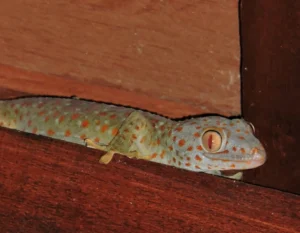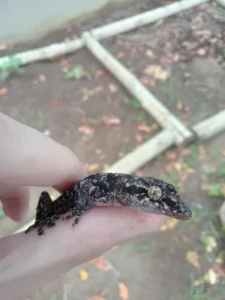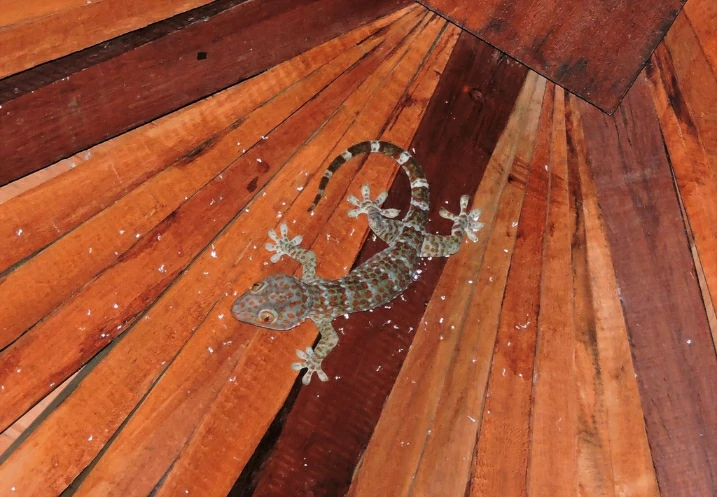Have you ever been lying in bed, and the house is totally quiet, when suddenly you hear a short, sharp chirp from the wall or ceiling? You look around and see a tiny gecko sitting there. Did it just make that sound?
Yes, geckos really do chirp at night. They use these sounds to mark their space, attract mates, or “talk” to other geckos nearby. Most people think lizards are quiet, but geckos are actually some of the loudest reptiles around, especially after the sun goes down.
And it’s not random. Each chirp, click, or bark has a reason.
Geckos developed these calls to survive in the dark nights, where insects crawl, other geckos roam, and predators might be listening.
Why Geckos Chirp at Night
Most geckos are nocturnal, which just means they’re active at night. During the day, they hide in cool, shaded spots to stay safe from predators and heat.
At night, everything changes. Their eyes are built for low light, and the quiet makes it easier for them to talk.

Chirping at night is basically their way of saying, “This is my space,” or “I’m ready to mate.” When it’s dark, other senses take over, so sound becomes very useful.
You might even notice some geckos get louder when the moon is bright or when leaves rustle in a soft breeze.
In tropical areas, geckos chirp along with frogs, insects, and other night animals. Each sound has its own space.
Chirps make sure their message isn’t lost in all the night noise.
How Geckos Make Their Chirps
Geckos don’t have fancy vocal cords like mammals or birds. They make sounds using special parts in their throats and mouths.
Some press their vocal sacs to make calls louder, while others make soft clicks or barks by quickly opening and closing their mouths.
The sound changes depending on the species. A common house gecko gives short, high-pitched chirps when it comes across another gecko.

Leopard geckos might just squeak or bark quietly, almost like a tiny squeaky toy.
Think of it like each species has its own “voice.” A chirp isn’t random, it’s a signal that helps them survive.
Are Geckos Trying to Talk to You?
You might wonder, “Are they trying to get my attention?” Nope. Geckos chirp to talk to each other, not humans.
You might make them louder if they feel threatened, but they’re not trying to be friends.
Still, if geckos live in your house, you might notice them chirping from a wall or ceiling.
That’s because your home gives them what they like in nature: quiet corners, warm spots, and lots of insects to eat.
Your house becomes a little night playground where geckos can call, mate, and mark their territory safely.
What Are Geckos Saying With Their Chirps?
Gecko chirps can mean a few different things:
-
Territory: A loud, repeated chirp warns, “Back off! This is my spot.”
-
Mating: During mating season, males chirp more to attract females.
-
Distress or threat: If a gecko feels cornered, its chirps get sharper and more frantic.
-
Social chat: Some species use softer chirps to say hello or check in with neighbors.
For example, a male tokay gecko gives a loud “to-kay” call at night. Females know this is a mating call. A quick click might just mean two geckos are saying hi, or telling each other to back off.
How Loud Can Gecko Chirps Be?
Some geckos are louder than you’d expect. A common house gecko can reach 60–70 decibels, that’s about the same as normal conversation.

In forests or cities, these calls help them stand out from other night sounds. A sudden chirp in your bedroom or on a porch is a gecko saying, “I’m here and alert.”
Some geckos even change how loud they are depending on the surroundings. In a quiet room, a chirp might sound piercing.
In a noisy garden, the same gecko will chirp louder so the message carries.
Do All Geckos Chirp the Same Way?
Not at all. Gecko chirps are all over the place. Some are high-pitched, some low, some fast and repetitive, some slower with pauses.
Their vocal parts, size, and environment all change the sound.
For example:
-
House geckos make short, repetitive chirps that almost sound like tiny clicks.
-
Tokay geckos make a loud, drawn-out “to-kay” call that’s easy to hear from far away.
-
Leopard geckos are quieter and might only squeak if a rival or mate is nearby.
Each sound has a purpose. You could think of it like a gecko language, where every species has its own way of talking.
Can Geckos Chirp During the Day?
Some geckos can, but it’s rare. Daytime chirping exposes them to predators, so most stay quiet.
During the day, they mostly use body movements and signs to talk.
At night, chirping is safer and works better. Darkness hides them, and sound travels farther in the cool night air.
Nighttime is their best time to talk.
How to Tell Which Gecko Is Chirping
If geckos roam your home, you can sometimes figure out which one is calling just by listening. A loud, repeated call is probably a tokay gecko.

Short, high-pitched chirps are likely house geckos. Soft squeaks might come from leopard geckos or other quiet species.
Pay attention to rhythm, pitch, and pattern. Some geckos chirp in quick bursts, others with longer pauses.
Watching at night with a flashlight (without bothering them) can help you match the sound to the right gecko.
Do Geckos Warn Each Other About Danger?
Yes. Chirps aren’t just for mating or territory, they can be warnings. A sudden chirp can tell nearby geckos that a predator is close.
It’s a simple but effective way to stay safe.
Imagine a gecko on a tree branch in a rainforest. A bird swoops nearby, and it gives a sharp chirp.
Other geckos hear it and hide or freeze. It works every time.
Why Gecko Chirping Surprises People
Many people think lizards are quiet because the ones they see in the day don’t make noise.
But geckos aren’t ordinary lizards. Evolution gave them the ability to make sounds most reptiles can’t.
Chirping is one of the things that makes them special. While snakes, most lizards, and turtles stay mostly silent, geckos use sound as a tool.
It helps them mark space, attract mates, and survive in places full of other animals.
Conclusion
Geckos really do chirp at night, and their sounds aren’t random. They help them survive, communicate, and mate.
From sharp warnings to soft social chirps, every sound has a meaning.
Next time you hear a tiny chirp in the dark, take a moment to listen.
You’re hearing a conversation that’s been happening for millions of years, shaped by night, evolution, and the simple need to survive.
Hi, my name is Ezra Mushala, i have been interested animals all my life. I am the main author and editor here at snakeinformer.com.

